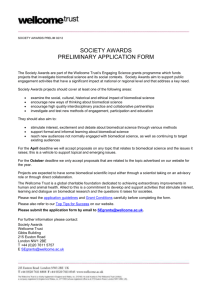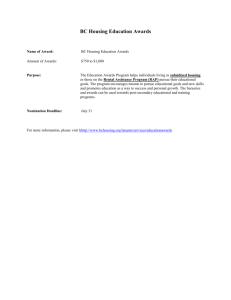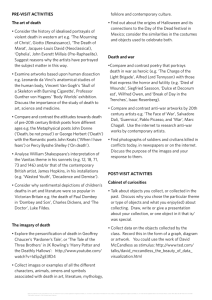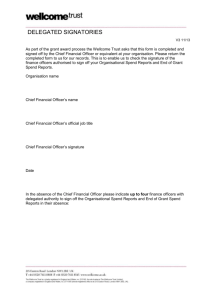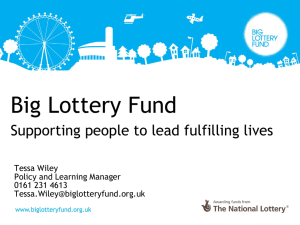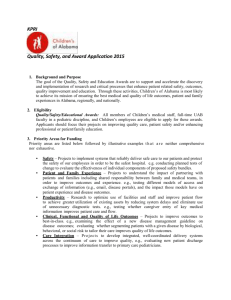Application Guidelines
advertisement
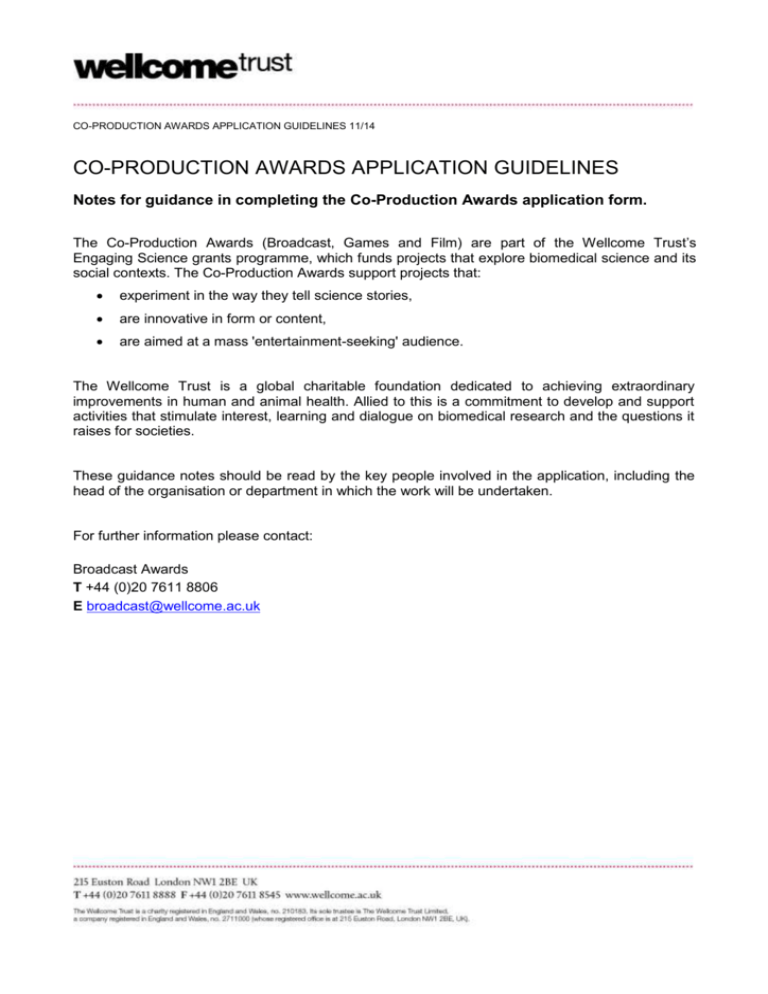
CO-PRODUCTION AWARDS APPLICATION GUIDELINES 11/14 CO-PRODUCTION AWARDS APPLICATION GUIDELINES Notes for guidance in completing the Co-Production Awards application form. The Co-Production Awards (Broadcast, Games and Film) are part of the Wellcome Trust’s Engaging Science grants programme, which funds projects that explore biomedical science and its social contexts. The Co-Production Awards support projects that: experiment in the way they tell science stories, are innovative in form or content, are aimed at a mass 'entertainment-seeking' audience. The Wellcome Trust is a global charitable foundation dedicated to achieving extraordinary improvements in human and animal health. Allied to this is a commitment to develop and support activities that stimulate interest, learning and dialogue on biomedical research and the questions it raises for societies. These guidance notes should be read by the key people involved in the application, including the head of the organisation or department in which the work will be undertaken. For further information please contact: Broadcast Awards T +44 (0)20 7611 8806 E broadcast@wellcome.ac.uk CO-PRODUCTION AWARDS APPLICATION GUIDELINES 11/14 ELIGIBILITY CRITERIA The scheme is only open to those working in the broadcast, games and film industries. The Co-Production Awards supports projects in TV, radio, games or film that engage (in whole or part) with biomedical science and its impact on our lives in an innovative, entertaining and accessible way. The Awards fund projects that take an original approach to their subject, experiment with ideas and have the ability to reach and entertain a large UK audience. Projects must demonstrate the potential to captivate and enthral the audience. They should be aimed at a large 'entertainment-seeking' rather than a ‘science-seeking’ audience. Proposals must demonstrate the project’s ability to reach a mass audience; this would normally be through a secured distribution platform. Successful will demonstrate a robust finance plan and true partnerships with the funders and distributers needed to drive quality and guarantee audience attention. To be eligible, applicants must be based in the UK or the Republic of Ireland, although other members of the project team can be based overseas. The proposal must be aimed at a mainstream UK and/or Republic of Ireland audience in the first instance, but the subject matter can be international. Projects must be scientifically sound - we look for scientific input either through a scientist taking on an advisory role or through direct collaboration. Projects that are not eligible for Co-Production Awards include film or games projects where the primary aim is education, health promotion or campaigning; arts projects for therapeutic purposes; or projects that do not touch upon an aspect of biomedical sciences or the history of medicine. No employee or Governor of the Wellcome Trust may apply. Applicants may submit more than one grant application to the Trust at any one time, provided the proposals are clearly identified as being different. Resubmissions of the same project will not be accepted to any Engaging Science scheme unless the Principal Applicant has been invited to re-apply by the scheme’s advisor in writing. The Trust requires a proportional share of any financial benefits arising from any commercial exploitation. The Wellcome Trust will also expect certain rights and credits in return for their investment. WHAT CAN BE APPLIED FOR? The Co-Production Awards are available up to £40 000, for a maximum of three years – and are only available to part-finance projects. In exceptional circumstances, and by invitation only, the Wellcome Trust offers Co-production Awards up to £300 000 – for projects that are outstanding in ambition and impact. Eligible projects must be co-produced in association with a broadcaster or other mass entertainment platform – where a clear distribution platform has been secured – and are primarily for applicants and teams that can provide evidence of an excellent track record in producing high-quality and original content that reaches mass audiences. The Co-production Award must only part finance the project; i.e. at least matching funding should already be secured for the project. All Co-Production Awards are subject to contract and terms may be negotiable. Page 2 of 8 CO-PRODUCTION AWARDS APPLICATION GUIDELINES 11/14 Awards range from over £40,000 up to £300,000 (exclusive of VAT) for production costs. Applicants are encouraged to apply at a level appropriate for the impact of the project, and applications must prove necessity and describe potential impact of Wellcome Trust funding to the project (see ASSESSMENT CRITERIA below). If you are looking for development funding for projects, please see our Development Awards for funding up to £10 000. If your proposed application is for public engagement surrounding your project (eg, film outreach through Q&A screenings), please see our People Awards. If your proposed project has a strong innovative artistic dimension, please see our Arts Awards. If you would like advice on the eligibility of your project or how to apply, please contact the Broadcast team for further information (well in advance of the advertised deadlines). Costs requested can include: personnel costs directly related to the project direct activity and production costs including venue costs, equipment and materials project travel costs, including costs of travel to monitoring meeting and attendance at relevant UK conferences or film festivals project publicity costs project administration costs where this is not already covered by other funding. What is not covered: full economic costs http://www.wellcome.ac.uk/About-us/Policy/Policy-and-positionstatements/WTX026852.htm salary costs of staff who are already funded by their organisation core overheads of the applying organisation not related to the project, e.g. heating, rent expenses incurred in submitting an application (including attending interviews) academic courses or research such as Masters degrees or PhDs costs arising prior to the start date of the project. HOW TO APPLY & SELECTION PROCESS Co-production Awards (up to £40 000) You will need to complete a full application form [Word 376KB]. Please email an electronic copy of the completed form to PEgrants@wellcome.ac.uk. Support material should ideally be sent electronically. If this is not possible, they should be sent to our postal address: Broadcast Awards, Wellcome Trust, Gibbs Building, 215 Euston Road, London NW1 2BE, marked for the attention of the “Co-Production Awards (Broadcast, Games and Film)”, with your name and Wellcome Trust reference number (which is provided after we confirm receipt of your application). Receipt of your application will be acknowledged electronically within 5 working days of the deadline. The decisions of the Wellcome Trust will be final. Every effort has been made to develop a thorough and informed assessment process. The Trust reserves the right not to enter into any correspondence about the assessment process and/or any subsequent monitoring procedures. Page 3 of 8 CO-PRODUCTION AWARDS APPLICATION GUIDELINES 11/14 Co-production Awards (up to £300 000) These awards are by invite-only. In the first instance, you must submit an expression of interest form [Word 293KB]. Forms should be emailed to PEgrants@wellcome.ac.uk. We would suggest that you discuss your project with a member of our Broadcast Team before submitting this form. You are advised to read these guidelines prior to submitting your Expression of Interest form (and full application form, if applicable). The decisions of the Wellcome Trust will be final. Every effort has been made to develop a thorough and informed assessment process. The Trust reserves the right not to enter into any correspondence about the assessment process and/or any subsequent monitoring procedures. ASSESSMENT CRITERIA All eligible projects will be assessed individually on merit and need by a Funding Committee. In particular, the following assessment criteria will be utilised: Originality and strength of the concept and approach; Potential to reach and engage a mass audience with the subject matter in an accessible way; Quality of approach to collaborating with expert advisors and how this will impact on the final outcome; Consideration of scientific subject matter and approach to science content (and its social context); Necessity and potential impact of Wellcome funding to the proposal; Project feasibility; Strength of project team and partners; Justification and appropriateness of the budget. Page 4 of 8 CO-PRODUCTION AWARDS APPLICATION GUIDELINES 11/14 GUIDELINES RELATING TO QUESTIONS ON THE FORM APPLICANTS’ DETAILS Q1 Principal Applicant The Principle Applicant (PA) should be the person ultimately responsible for project delivery. For example, the PA could be the head of a company who will be present throughout the duration of the project until transmission, dissemination, evaluation, and Wellcome Trust reporting period. Q2 Name and address of the organisation to which the grant will be awarded Payments will be made to this organisation. Q3 Project Lead The Project Lead is the person who is responsible for delivering the project on a day-to-day basis. This is the individual with whom the Trust will correspond about the grant, should the application be successful. The Project Lead does not necessarily have to be employed by the organisation to which the grant will be awarded. Q6 Area of science Please select three categories from the list below that are most relevant to your Application: Animals and veterinary medicine Cells and molecular biology - includes studies of cell structure, function and processes, pharmacology, drugs and drug development Environment and health - includes health impacts of climate change, including nutrition and environmental changes to disease General biology/medical science Genetics History of medicine and science and the medical humanities How science works - e.g. the scientific method vs. natural philosophy (i.e. philosophy of science), perception of risk, use of statistics in science - must look at examples from the biology/medical field How the body works - includes research into understanding normal function and physiological processes e.g. reproductive and developmental biology, toxicology and ageing How the mind works - includes cognitive and behavioural neuroscience, mental health, psychiatry, psychology, and psychoanalysis Infectious diseases - includes immunology, virology, epidemiology Medical technologies and medical engineering Medicine - the study, diagnosis, treatment and prevention of diseases and disorders as well as patient care, and complementary and alternative medicine (includes non-Western medicine) Page 5 of 8 CO-PRODUCTION AWARDS APPLICATION GUIDELINES 11/14 Public health - includes health services, systems and resources, clinical trials, epidemiology, vaccines Science and medicine in society - includes legal and ethical issues surrounding research, sociology of science, regulation and governance of research/science/medicine Social and personal experiences of health - diseases and disorders which biomedical science is endeavouring to understand and treat Impact of other disciplines on biomedical science - e.g. chemistry – pharmaceuticals; physics – scanning technology, particle accelerators for basic understanding and treatment, engineering; implants; anthropology; economics; social history Other - please specify PROJECT AMOUNT AND DURATION Q7 (a) and (b) Costs Co-Production Awards are set to a maximum of £40 000 (exclusive of VAT). Q8 Proposed start date The Wellcome Trust does not fund retrospective costs. Applicants should ensure the start date (for use of any Wellcome Trust funds) is not before the date you expect to receive a funding decision. The decision process is two months between advertised deadlines to a final funding decision. You should also allow a minimum of six weeks between the planned notification date and your project start date for financial administration. PROJECT PROPOSAL Q14 Evaluation The Wellcome Trust is interested in the learning gained from collaborating with experts (i.e., the process, in addition to the overall outcome/product); and how audiences engage with biomedical content and its surrounding issues. All applicants (to Engaging Science grant schemes) are also advised to refer to the Public Engagement Evaluation Guidelines document: www.wellcome.ac.uk/stellent/groups/corporatesite/@msh_grants/documents/web_document/wtd0 03580.doc Q15 Impact & justification of costs Why is Wellcome Trust funding important to your project? What will the funding allow you to do that you would not otherwise be able to do? How will this affect the shape of the project or improve the audience experience of your project and enable them to engage more deeply with the scientific content or better appreciate the role of science in society? Q16 Currency requested It is expected that applications will be costed in the currency which, in the view of the applicant(s), best enables the activity to be undertaken. In the majority of cases, the currency specified is likely to be sterling. Where this is not the case, the reasons for selecting the chosen currency must be clearly stated. If the application is successful, the award will be made in the currency specified in the application, providing that the Wellcome Trust’s currency requirements are met. Page 6 of 8 CO-PRODUCTION AWARDS APPLICATION GUIDELINES 11/14 Q17 Budget Please provide (1) a one-page top line budget for the entire project, and (2) a complete budget breakdown detailing full project income and expenditure. In the complete budget breakdown, please detail all project costs over the lifetime of the project. For example, fees should be broken down into role, time spent on project and unit cost per role. Where applicable, VAT should be included in all project costs. If applicable, be certain to also include details of any project funding that is being provided by other sources/co-producers. Describe whether said funds are received, pending (and by what date), etc. Grants are strictly cash-limited and will not be supplemented under any circumstances. Projects should ensure adequate expenditure is allocated for the marketing and dissemination of the work and for contingency. Applicants should adhere to agreed Equity/Union Rates guidance when calculating payments for personnel. Q19 Visual and contextual material in support of your application The importance of the supporting material is often underestimated. We encourage you to submit supporting material to help the committee understand your creative vision for the proposed project as well as examples of previous projects to demonstrate the style and quality of your work. Electronic submissions are preferred. Support material could include: storyboards or still images DVDs and digital media scripts, treatments or printed materials web links to example projects, prototypes and/or taster tapes. Please note we cannot accept support material in the form of slides, audio or VHS tape. Applicants should be aware that funding committees will have access to all support material whilst making their funding decisions. Support material should be sent to the Broadcast Awards postal address or by email to broadcast@wellcome.ac.uk by one week after the application deadline, at the latest. Please mark each piece of material clearly with the name of the Principal Applicant and the Wellcome Trust reference number. The Wellcome Trust accepts no responsibility for any support material submitted. Please note that the Trust cannot return support material, so digital material is preferred. Page 7 of 8 CO-PRODUCTION AWARDS APPLICATION GUIDELINES 11/14 Q21 Rights, Credits and Exploitation Rights The Wellcome Trust expects to acquire the non-theatrical (or equivalent), clip and promotional rights as a minimum for its investment. Additional rights may be required on a project-by-project basis and depending on the amount requested. Credits The Trust expects that its contribution to any project is suitably acknowledged in any content, programme or other output as well as in all publications and publicity concerning the Project. For projects above £40 000, the Trust will usually expect to appoint an Executive Producer to act on behalf of the Trust and that this Executive Producer will receive an individual credit in addition to the Trust credit. Exploitation The Trust requires a proportional share of any financial benefits arising from any commercial exploitation in order to comply with charitable law. All Co-Production Awards are subject to contract and terms may be negotiable. Q22 Projects working with young people It is the duty of funded organisations and host organisations to ensure that children are safe while participating in arts and science activities, and to have policies and procedures in place to promote safe working practices. Guidelines for organisations are available from the Disclosure and Barring Service http://www.homeoffice.gov.uk/agencies-public-bodies/dbs/. Where no Disclosure and Barring Service (DBS) or Criminal Records Bureau (CRB) check has previously been carried out, the Wellcome Trust will require an enhanced DBS disclosure for those named project team members prior to the start of any Wellcome Trust funded activities. The Trust will fund any additional DBS checks required for the project to take place. These should be included in the application’s budget. Q23 Health and safety The Trust is keen to ensure that the Health and Safety aspects of projects have been considered. If appropriate, the Trust may request proof of a project’s risk register and/or public liability insurance. Any issues raised, or related queries, will be discussed in the Funding Committee Meeting. THE UNDERTAKINGS The Undertakings at the back of the application form should be signed by the Principal Applicant and the Recipient of the Award. The Recipient is the representative of the organisation to which the grant is being awarded (this will normally be the same person). Page 8 of 8
